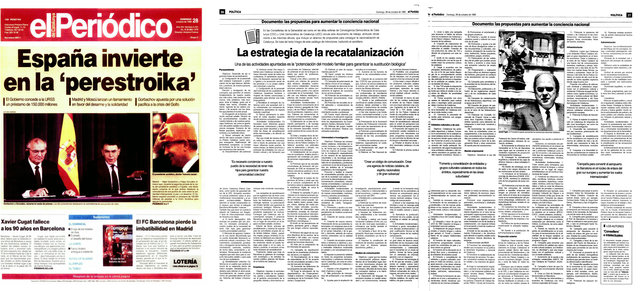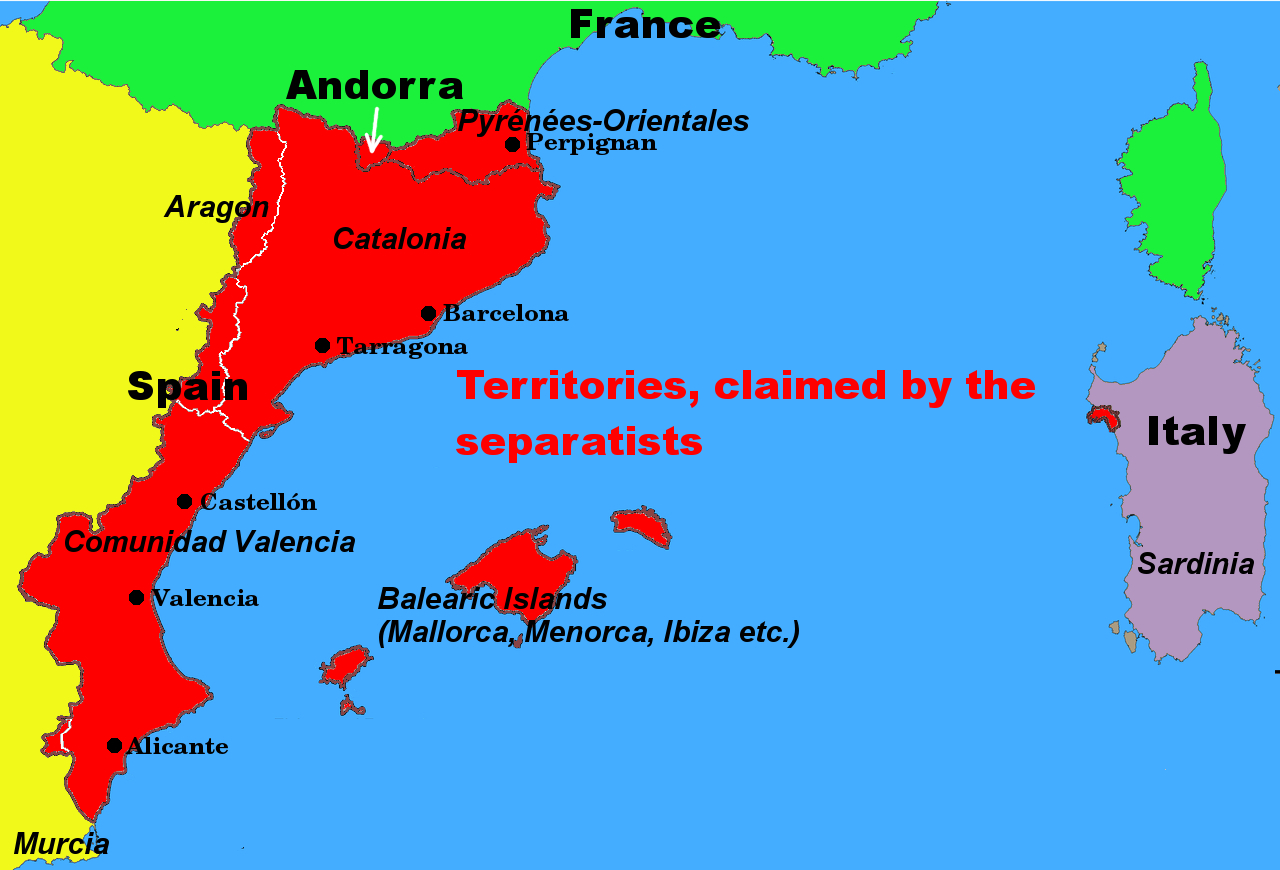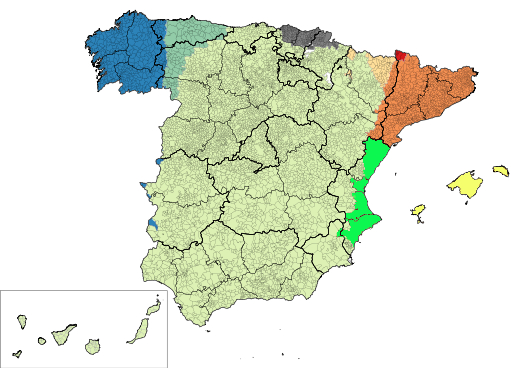What purpose does it serve?
Genderism, wokeism and language imposition
February 05, 2023
The year before last (2021), various newspapers ran the headline: Volkswagen Group (VW) forces employees to gender. (Underlining by me) With this, the company only followed the practice of Hanover, the capital of Lower Saxony, which has practiced genderism since 2018. Lower Saxony and the federal government are the most important shareholders of VW due to the German VW law.
This practice of language imposition is now being considered and/or introduced by more and more (especially DAX [ German Stock exchange index] ) company boards. Despite the rejection and the resistance of the population. With the Wokeism (e.g. Mother and Father Replaced by Parent 1 and Parent 2 in US passports) a list of words has been added, which one may not use any longer.
What does this have to do with the language impositions of various Spanish regional governments?
How to read this article?
The anglo-american world is mostly only plagued by wokeism, not so much by genderism. „A statement on the State Department website noted: 'These improvements (parent 1 and 2 instead of mother and father) are being made to provide a gender neutral description of a child’s parents...'“ To learn about wokeism, please read here.
The main explanation of genderism lies in the different application of articles and word endings. If you know about genderism in Spanish and German, please skip to the last part of this article: „Genderism, wokeism and language imposition“. If you don't know, continue here and learn more about the absurdities of modern life.
Gendering in other languages than English
English knows only one article. That is different in languages like French, Spanish or German, the latter knows 3 articles. The articles are called male, female and the third only German is called neutral, though they have never anything to do with a biological sex. Using plural in Spanish, „El“ becomes „Los“ and „La“ becomes „Las“, whereby „Los“ refers to males only or males and females. Like „Los padres“ (the parents) and „Las madres“ (The mothers). Plural in French turns „Le“ and „La“ into „Les“, which always refer to males only, females only or males and females.
The most complicated situation in German language makes it prone to the use of extreme genderism.
How genderism makes the German language unspeakable
Let's take as an example the word „Freund“, which means friend.
In German literature you will now find very often word constructions like „Freund*innen“ or „Freund_innen“ or „Freund:innen“ or „FreundInnen“ or „Freunde und Freundinnen “. It seems to become an endless list with wordappendages of „innen“. The speakers on German TV make a meaningful pause in between „Freund“ and „innen“, trying to make the gender difference known.
These genderised words are meant to remind you of the fact, that women in our society are disadvantaged and you should act accordingly.
To understand better, here follows a brief introduction into German grammatical gender, used easily and without thinking by anyone, whose mother tongue is German:
A Freund is male, a female would be Freundin.
Freunde is the plural for Freund and can be male only or male and female friends.
If you want to refer to female friends only, then you say Freundinnen
The application of articles has got nothing to do with the sex, though it is called gender. You could call it instead of male, female and neutral A, B and C. A typical example:
der man (male)
die woman (female)
das girl (neutral)
It is obvious, that a girl is female and not neutral. But as I have said, you could say A, B and C. the grammatical gender has got nothing to do with the sex.
Whenever you use the plural of a word, you have to take the female „die“ (pronunciation = dee) as article, „the men“ becomes die Männer, making the female (B) article the most used in German language. Of course, obviously this did not help to expand awareness of the oppression of the female sex. Yet genderers expect this from their efforts to „feminize“ even more things.
Genderism, wokeism and language imposition
The German Wikipedia (by the way: information about „Gendern“ in Wikipedia is only available in German and French) explains gendering (gendern) this way: „Gendern (stands) in German for a gender-conscious use of language that seeks to express equal treatment of the sexes in written and spoken language“, thus sidestepping the question of who is gendering? This is a typical, ideological Wikipedia definition, because Wikipedia is not objective, but ideologically driven by the very people who want to gender and enforce 'woke' behavior. But that's not the issue here. Just as I don't want to talk about the pros and cons of gendering here. This blog is about separatism in Spain and language imposition as a vehicle. As with language imposition, it is about the coercion involved and the interests behind it.
„Gendering“ is not an acting subject with its own will, but an object. Persons act and as much as I am for the equal treatment of the sexes, I do not have to approve of the means with which this is to be enforced. The end justifies the means is usually a slogan of those who have only their own end in mind and have no problems with the use of coercion and violence.
It doesn't matter if, like journalist Rod Dreher, despite his disapproval, says „Wokism is a soft totalitarianism.“ Those who start with „soft“ usually have no trouble switching to „rough“ when they fail.
This is also shown by the fact that such ideologues do not mind using coercion against a majority. Germans do not want to gender and do not need a list of unwanted words such as „father“ and „mother“. I am wandering if it is politically correct, if you ask, if the female or male person has to be put as parent 1 will be decided by a nice American shoot out. Sorry, I am not behaving well. Newsweek titled already in 2019 the French also go for parent 1 and 2.
Unfortunately, there are only isolated initiatives that want to ban public institutions from using gender imposition.
But prudence should be applied. As totalitarian as gendering is handled in many countries of the West today, the attempt to prohibit gendering or wokeism per se is just as unhelpful. Freedom is always the freedom of those who think differently.
Whenever I see that a text, a book, a TV program or a video is gendered, I consider whether I really need the information offered there. As a rule, I opt for other information; you can't consume everything anyway and still be well informed.
However, the goal of the genderers has long since been achieved; the parliaments deal with this issue instead of the really politically important questions. People hardly notice when they argue about gendering, wokism, and the language imposition that goes with it.
This is exactly what is happening in Spain, although it seems to me that the problem of gendering is not so prevalent. However, it is promoted by the same political forces as in Germany, which can be seen, among other things, in the naming of the party Unidas Podemos (gender-free, it should be Unidos), a party that, despite all the differences, can probably be said to have a certain kinship with the German Greens.
Instead, Spain prefers to argue about language policy, especially in schools. Arguments about percentages for this or that language, completely detached from the fact that people learn best in their mother tongue. The solution is simple: let the parents decide in which language the children learn. This would put an end to the quarrels, and school performance could be improved thanks to learning in the mother tongue.
Fortunately, people don't always argue, but sometimes act. The mass of Germans don't gender. And Spain?
The capital does not speak Valenciano one could read on January 30, „80% understand Valenciano, but only half of them can speak it.“ What would be the result of a survey from the province, where regional language is undoubtedly more frequently used? The last surveys were all long ago, but nowhere did they show a majority in favour. Only the imposition of Valenciano has increased.
| | | | Click here to subscribe or cancel your subscription |
Myths and deceptions of Catalan nationalism

Here you'll find the translation
Languages in Spain
Spanish, Basque, Catalan, Mallorquin, Valenciano etc.
The strategy of recatalanization
 1980 the Spanish journal "El Periodico" published a secret document about the strategy of the Catalan government. It shows in a frightening way the actual spiritual world of the separatist leaders.
1980 the Spanish journal "El Periodico" published a secret document about the strategy of the Catalan government. It shows in a frightening way the actual spiritual world of the separatist leaders.Now it is available in english translation.
Pancatalanism
the separatist's imperial claim
 The Catalan government exports the conflict into communities with Catalan population, supporting all efforts of the separatists including financial means to destroy Spain.
The Catalan government exports the conflict into communities with Catalan population, supporting all efforts of the separatists including financial means to destroy Spain. An important tool is the establishment of a language dictatorship that is not afraid to use the same means as Franco.
Separatist indoctrination

Click here to read the study
Language imposition and democracy

An essay in 6 parts on the potentially violent effect of language imposition containing contributions from South Africa, Catalonia, Ukraine and France.
go to part 1 SticSti
Publications
 The title says: "Catalonia, a conflict is exported. Insights of a migrant"
The title says: "Catalonia, a conflict is exported. Insights of a migrant"Sorry, up to now, this book is only available in German. However, drop us a line, if you are interested to learn more Contact.

